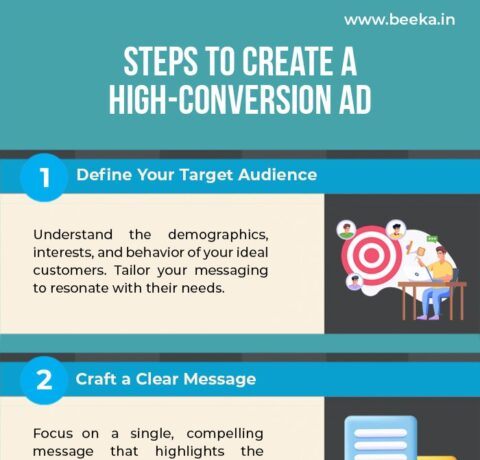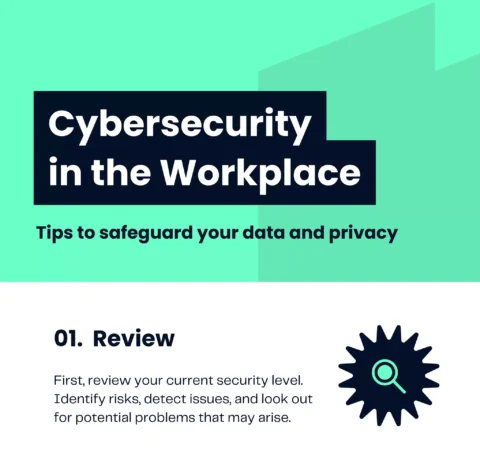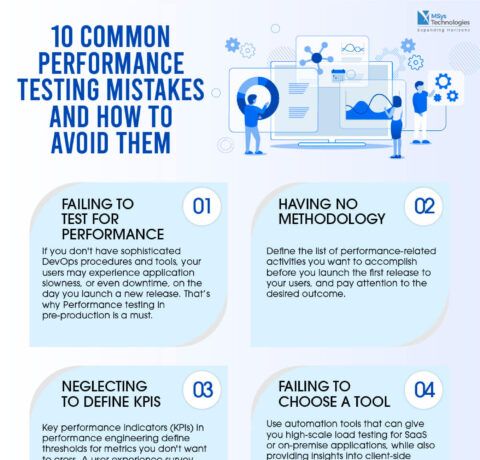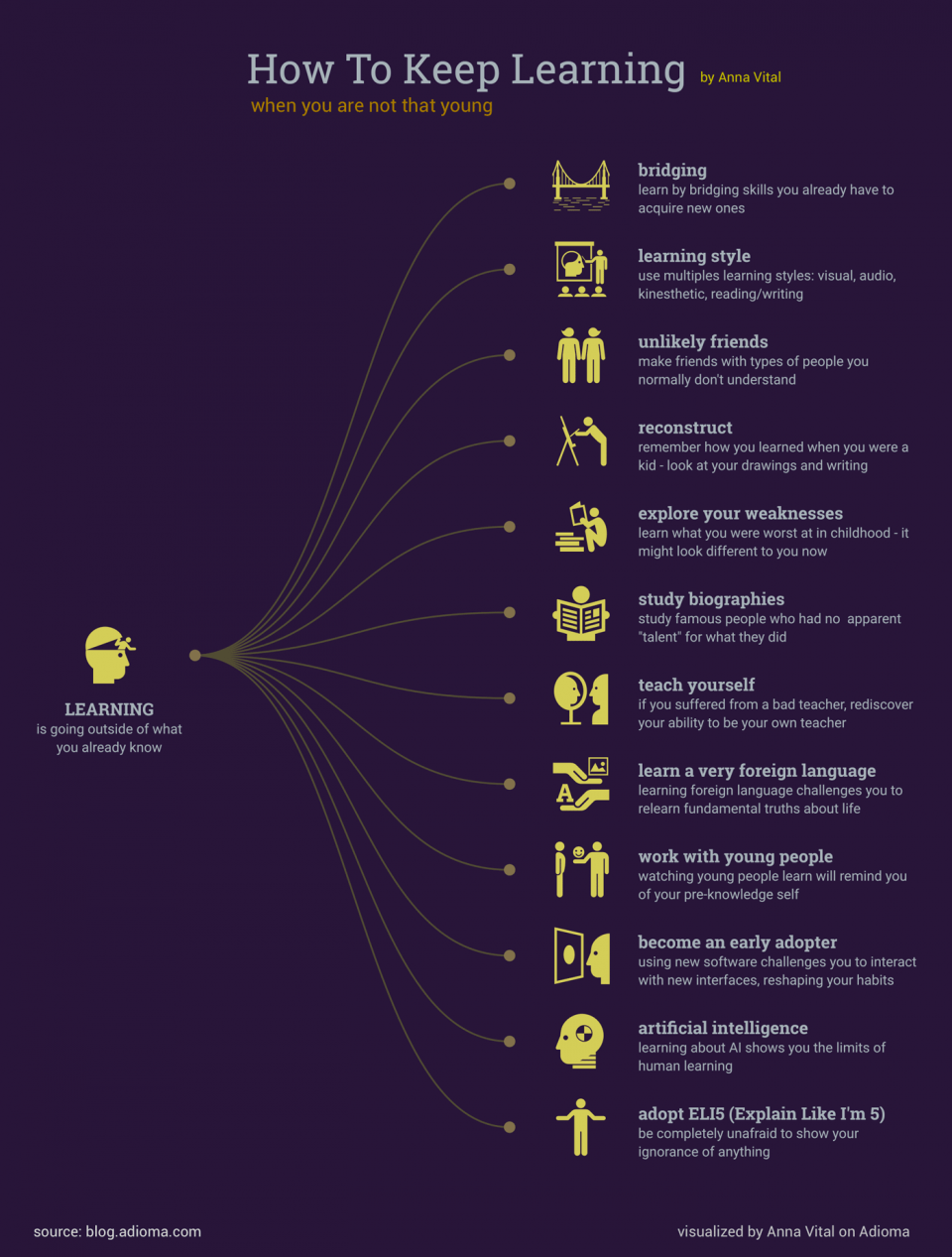How to Keep Learning (When You Are Not That Young)
At some point in our lives, we all notice that learning does not come as easily as it used to. We start wondering if it is too late or we are too old. But what if there are ways to keep learning even when you are not that young? Would you want to?
Bridging What You Know To What You Don’t Know
If everything that can be learned is an ocean, then what you have learned so far is a bridge. But it does not bridge over the entire ocean. What it does do though is give you an opportunity to extend what you know to things you don’t. In fact, by learning one thing you can bridge to everything else that can be learned.
Learning Styles
Do you know your learning style? Even if you know your learning style, do you seek out the types of learning tools that suit your style? If you are a visual learner, for example, do you visualize your thoughts, write visual notes, or visualize your work product?
Friends Teach You the Most
By our mid-twenties most of us have already chosen the types of people we like and get along with. We understand them. Ironically, these are not the people we would learn from the most. They already agree with us, they share the same habits, they probably have similar skills. Being around people who are not like us would be uncomfortable, even painful, but they would show you the limitations of what you have learned so far.
Reconstruct your learning experience
Remember how you learned when you were a kid? You probably don’t remember exactly because of memory biases. But if you look at your writing and drawings from your childhood, you can reconstruct your thoughts and transport yourself back into that hyper-learning state of mind.
Explore your weaknesses
Are you still great at writing but bad a math? Why is that? When did it start? Have you tried to use math as an adult for your work? Look at a math textbook now that you are an adult. Does it still look scary? Why is it scary? Those questions will point you in the right direction. Do this analysis for everything you consider yourself bad at.
Study biographies of super-learners
“Super-learners” is another way of saying “late bloomers”. People who have a talent for what they do are not necessarily super-learners. Early success is a bad teacher. The people who succeeded later in life, however, most likely did so because they kept on learning as adults without the early manifestation of talent. Study their biographies. Here are a few of them.
Teach yourself
If you suffered from a bad teacher, rediscover your ability to be your own teacher. You know yourself best by now. Now that you have lived with yourself for a few decades, you know how to interest yourself in learning and how to reward yourself. If you received negative feedback from a teacher before, you might find that they just didn’t find the right approach to you. Now you are not dependent on another adult to teach you. Now are your own teacher.
Learn a foreign language
Learning foreign languages challenges you to relearn fundamental truths about life. The more “foreign” a language is the more it will challenge what you think you already know. Being fluent in a foreign language will change you in ways you never thought possible.
Work With Young People
Watching young people learn will remind you of your pre-knowledge self. What were you like before you learned to talk? Do you remember how you didn’t know anything at all and then you learned somehow? Did you think in pictures or in words? What did your train of thought look like? Sequential or multi-threaded like a tree?
Become an Early Adopter
Using new software challenges you to interact with new interfaces, reshaping your habits. Unlike the physical world, in the digital world the speed and convenience of doing things changes fast. New interfaces simplify tasks and optimize our thinking about them. Interface designers spend their time to figure out how to make your brain react faster and go through fewer steps to accomplish what you want. By adopting a new interface you upgrade your brain. So do it often and it will become a skill in itself.
Artificial Intelligence
Learning about artificial intelligence shows a world where leaning is non-judgmental because the machine is the one doing the learning. Do AI algorithms make mistakes? Sure. We call them errors. We have separate names for people making mistakes and machines making mistakes. We judge people. We do not judge machines. When we get passed the judgement, we can see that the real key to learning is
- detecting errors,
- learning why they happened,
- changing our algorithm to avoid those errors.
For machines error detection and finding their cause sound matter-of-fact. For people? Instead of analyzing our errors we might dwell on them or ignore them. We take errors personally. We are afraid they are not a glitch but an attribute of our character. We are afraid that our errors are unfixable. But if errors are the key to learning in machines, why is human learning any different?
Adopt ELI5 (Explain Like I’m 5)
Explain Like I’m 5 is is devoted to explaining things to adults in a non-judgmental, non-condescending way. The reason why you should be unashamed to ask others to explain is that most people, no matter how successful, have deep knowledge in some limited area. People who are great in technical disciplines might have a fifth grader’s ability to draw and a very limited ability to distinguish colors, for example. An adult designer might have a hard time figuring out middle school math.
Of course, people will be surprised at your ignorance. Of course, they might not even realize their own. Tell them about ELI5. Ask them what they were like before they learned what they are so good at now. Both of you will learn from that.
Keep learning!







You can adjust your cookie preferences here.